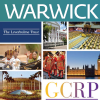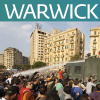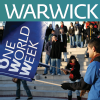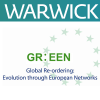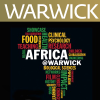-
The latest research, ideas and thinking from academics at the University of Warwick delivered to your tympanic membranes via the podcast browser of your choice. Use your phalanges to hit the subscribe button now!
-
This podcast series is the result of a partnership between the University of Warwick and the Industry and Parliament Trust, an independent charity that works to bring members of parliament and industry leaders together to exchange ideas and experience through a range of activities including fellowships, training and seminars. In these podcasts, policy-makers and business leaders meet academics from the University of Warwick to discuss issues that are high on the policy agenda and hear about the latest research in the field. This year our speakers are discussing topics including cyber security, China in the 21st century, and the future of UK food security. You can also find a briefing paper on each topic, written by the Warwick expert, at www.ipt.org.uk.
-
A collection created by the Department of Politics and International Studies to analyse and comment on current global political, economic and international relations issues.
-
The Warwick International Development Summit (WIDS) is being held on 18-20 November with students and key speakers identifying and exploring some of the challenges facing the world. WIDS is organised by the International Development Society, a student society at the University of Warwick that aims to engage students with global development and provide a platform to enable them to become actively involved. This year’s themes include green economics, climate change, corruption and transparency, and aid. The speakers include UNICEF representatives, economists, academics, members of political parties and activists.
-
The four-year Gendered Ceremony and Ritual in Parliament programme came to a close in October 2011 with a conference hosted at the House of Lords. This multi-site programme was based at the University of Warwick and led by Professor Shirin Rai from Politics and International Studies. Here we share some video highlights from the event, including a keynote lecture by the former Speaker in South Africa's first democratic parliament.
-
The Warwick Institute for Employment Research was established by the University of Warwick in 1981. The IER is one of Europe's leading centres for research in the labour market field. Its work includes comparative European research on employment and training as well as that focusing on the UK at national, regional and local level. The IER is concerned principally with the development of scientific knowledge about the socioeconomic system rather than with the evolution and application of one particular discipline.
-
Since the events of 9/11, security concerns have topped the political agendas of western governments. Given that the attacks of 9/11 were carried out by non-state agents, then the old Cold War argument that the concept of security should include non-military threats has gained currency among governments. Among the important, perceived non-military threats included in the analysis of state security is migration. According to Buzan "The threat of migration is fundamentally a question of how relative numbers interact with the absorptive and adaptive capacities of society ... The fear of being swamped by foreigners ... is easy to mobilize on the political agenda as a security issue." (People, States & Fear: The National Security Problem in International Relations, 1983).
-
The aim of the Festival is to showcase the varied and innovative social sciences research taking place at Warwick, involving staff and students from all departments and centres in the Faculty of Social Science, and many from other areas of the University. The theme for 2011 is "Public Engagement, Communication and Impact". The Festival will feature a range of workshops, lectures, seminars and other events focusing on this theme. This includes the Academy of Social Sciences Roadshow "Campaign for Social Science", and the launch of the Warwick Economic and Social Research Council Doctoral Training Centre (ESRC DTC). Speakers for the Festival include the business entrepreneur Ram Gidoomal CBE, and former Warwick Registrar Mike Shattock.
-

The 2011 Warwick RIPE Debate: 'Rethinking World Politics'. The 2011 debate was held on 8th March and features Professor Philip Cerny, Emeritus Professor of Politics and Global Affairs at the University of Manchester and Rutgers University, and Professor Jan Aart Scholte of the University of Warwick. Acting as Chair is Professor Richard Higgott, Pro-Vice Chancellor for Research at the University of Warwick. We were especially pleased to host Prof. Cerny present at the debate given his election as Distinguished Senior Scholar for 2011 by the International Political Economy Section of the International Studies Association. Prof. Cerny gives a wide-ranging talk on the longue durée of world politics, discussing the formation of the nation-state and its contingent (and ongoing) transformation under conditions of globalisation. Central to his enquiry is what he terms the 'neo-pluralism' fostered by transnational actors, who are increasingly bringing to bear a raison du Monde on the organisation of the multi-level political system. In his response to the talk, and drawing on his own ongoing project on 'Building Global Democracy', Prof. Scholte provides a number of talking points. These include the extent to which a neo-pluralist structure permits agency for particular marginalised and disenfranchised groups, and how (Western) scholars might adopt a more kaleidoscopic perspective on the over-arching political order.
-
Academics from various disciplines speak about the political situation in Egypt and what it means for the future of the country.
-
The One World Forum attracts high-profile speakers from across the world through a series of panel debates, with each speaker offering views on current issues, followed by an interactive session allowing the audience to debate what has been discussed. Forum is a platform for the exchange of ideas and ideologies, featuring leading luminaries from diverse professions, political spheres and academic disciplines. The One World Forum creates an opportunity to get new insights into the "hottest" issues affecting our world. Here, every attendant counts, every one of you has something to contribute.
-

Warwick International Development Summit (WIDS) took place on campus from Friday 19 – Sunday 21 November 2010. The overarching theme was “Resources, Crisis and Conflict - facing up to the new decade” and aimed to explore some of the challenges our globe faces as we enter a new decade. Warwick International Development Summit is organised by the International Development Society, a student society at the University of Warwick that aims to engage students with global development and provide a platform to enable them to become actively involved. The summit brought together stakeholders from different sectors in development - from governments, civil society organisations, academia, international institutions and the private sector in both developed and developing countries - to reconcile policy, practice and theory through critical engagement and constructive debate. There were a range of exciting and motivational speakers from UNICEF, DFID, the UN, as well as academics: * Katherine Nightingale, Senior Research & Policy Officer - Building Disaster Resilient Communities, Christian Aid * Dr. John Hancock, Councellor - Economic Research and Statistics Division, World Trade Organization * Valerie Msoka - UN Mission to Sudan * Julia Bucknall, Manager - Water Anchor, World Bank * Dr Anke Hoeffler, Research Officer - Centre for the Study of African Economies, University of Oxford A selection of podcasts from the event can be downloaded here.
-
The Modern Records Centre on the University of Warwick campus holds nationally important archives for the study of social, economic and political history, mainly from the mid 19th century onwards. These archives have been designated as an Outstanding Collection by the Museums, Libraries and Archives Council.
-
The Centre for the Study of Globalisation and Regionalisation, at the University of Warwick, is leading a research project on ‘Europe in a Multi- polar World’. The project will focus on emerging global governance structures and Europe’s place within them. Entitled Global Re-ordering: Evolution through European Networks (GR:EEN), will invest €10 million over four years into exploring questions of how Europe matters and indeed if and how it can continue to matter in an increasingly multi-polar world.
-
A conference held at Warwick focussed on 'Challenging Orthodoxies: Developing Critical Governance Studies'. The event brought together academics from across the social sciences to better understand how ‘orthodoxy’ varies from discipline to discipline, as well as to analyse the process by which critical ideas infiltrate, and are absorbed into, the orthodoxy over time.
-
The Knowledge Centre is a major initiative from the University which aims to ensure the University of Warwick continues as a primary source of knowledge and learning online. Academics from across the University often bring different perspectives on the same subjects. We have brought those academics together for "Tête-à-Tête" - a video series tackling cross-disciplinary ideas.
-
Africa@Warwick, a two day conference held in January 2010 highlighted research themes and teaching programmes connecting the University of Warwick to Africa. The event was organised by the University’s Sub-Saharan African Research Network (SSARN) and the Institute of Advanced Study (IAS). The diverse two-day programme outlined a sample of African-based research involving staff from the University of Warwick and colleagues located at Warwick’s strategic partner institutions across the globe. This series Youth and Children, Governance, Food and the Environment
-
Professor Wyn Grant from the Department of Politics and International Studies discusses the complexities of UK election politics in the year of a General Election.
-
‘Post-socialist punk’ is a historically and spatially comparative study of punk in Eastern Europe conducted by an international, collaborative team of researchers from the UK, Russia, Estonia and Croatia. The project aims to reassess the dominant understanding of punk in the West - as an aesthetic articulation of late capitalist social relations - based on the challenges posed by the socialist and post-socialist punk experience. By situating punk in a different political context, the reading of punk as subcultural resistance to dominant class relations is replaced by a more open question about the political significance of the transnormative cultural practices of punk in both socialist and post-socialist Eastern Europe.
-
With security concerns growing about North Korean nuclear ambitions this series hopes to examine some of the issues relating to the security of the Asia-Pacific region.
-
Over the past 200 years academic life has become a victim of its own success. It has trained people so well and its research has become so socially relevant that it has constantly had to resist economic and political curbs on its spirit of free inquiry. This resistance has often assumed the sort of studied anti- disciplinary stance that characterizes improvisational forms of expression – that unholy alliance of plagiarism and bullshit by which clever academics routinely overreach for the truth.
-
Memory Studies examines the social, cultural, cognitive, political and technological shifts affecting how, what and why individuals, groups and societies remember, and forget. Despite the epistemological and causal significance attributed to memory in the study of such questions as the formation of personal and public identity, culture and politics, and social communities, there remains dramatic divergence on the basic concepts and methods of the area.
-
Public lectures from the School of Law at the University of Warwick
-
A lecture series examining the French Historical Legacy; Constitutional Arrangements; Decentralisation and the State; The Party System; Pressure Groups and Policy Making; Foreign Policy and the EU.
-
A lecture series examining Globalisation and Welfare States; Classifying and comparing Welfare States; Some aspects of the policy-making process; Housing; Health; Education training and the Economy
-
It is now commonplace to claim that the attacks of 9/11 as well as the events that have flowed from them – war in Afghanistan and Iraq, the ‘war on terror’, the adoption of a policy of preventive war - have reshaped world politics. Governments have struggled to find the answers/policies/institutions to understand and mitigate the multiple threats posed by terrorism. This series seeks to bring together existing expertise within and beyond Warwick in a seminar series structured to enable a cross-disciplinary dialogue around these dilemmas that can enhance both particular disciplinary research agendas, develop synergies between relevant disciplines (for academic staff and postgraduate students) and create policy outreach. The core focus of the series is the choices that governments have made about the relation between traditional assumptions about civil liberties and the allegedly new character of the threat, and therefore of the security measures necessary to meet that threat.
-
Discussions and papers on a range of issues in Politics and International Studies
-
A collection of podcasts and videos from the University of Warwick focussing on research stories in society, politics, philosophy and law.




